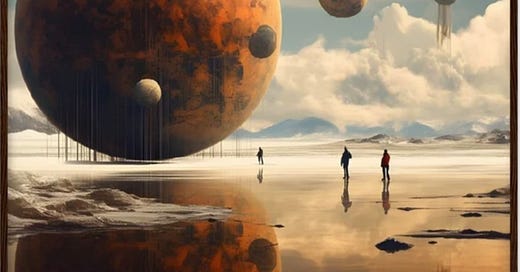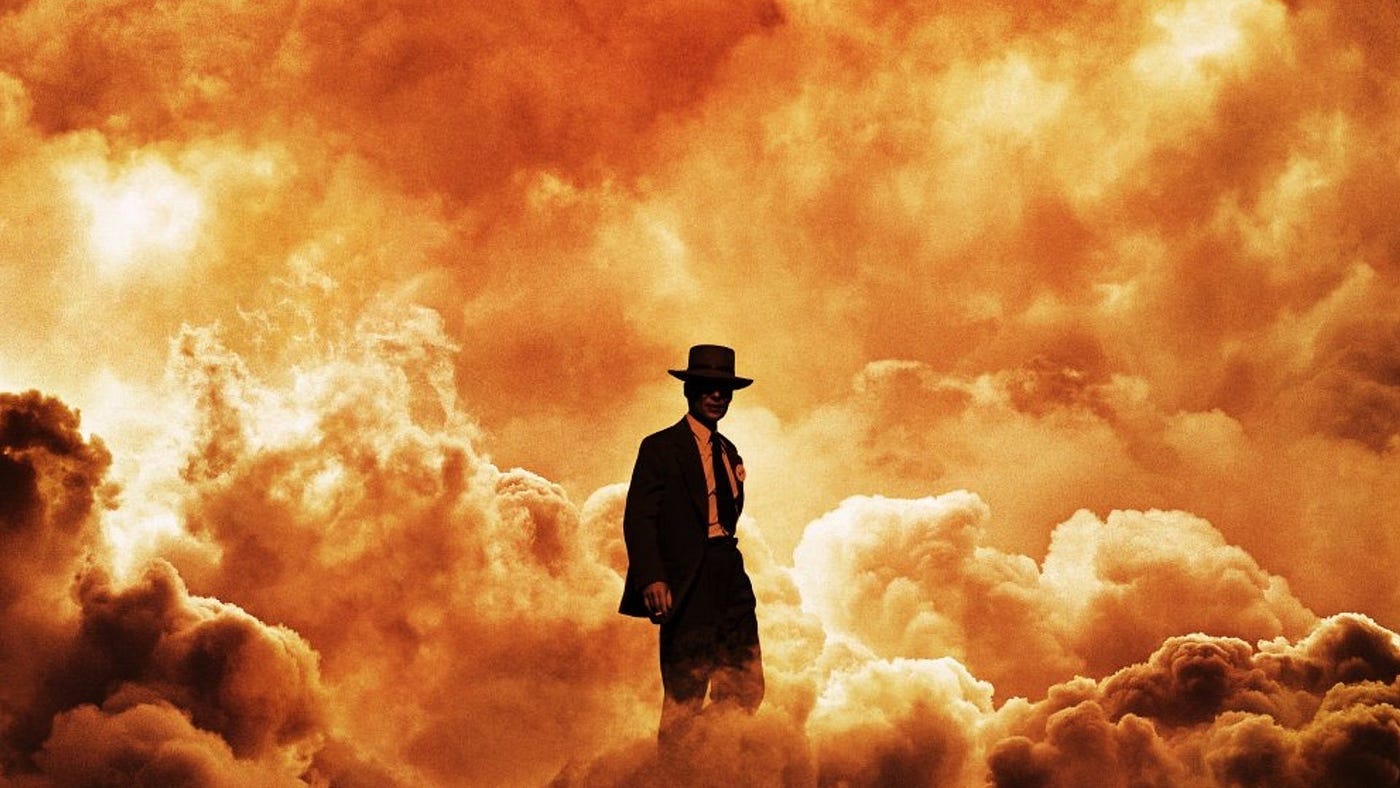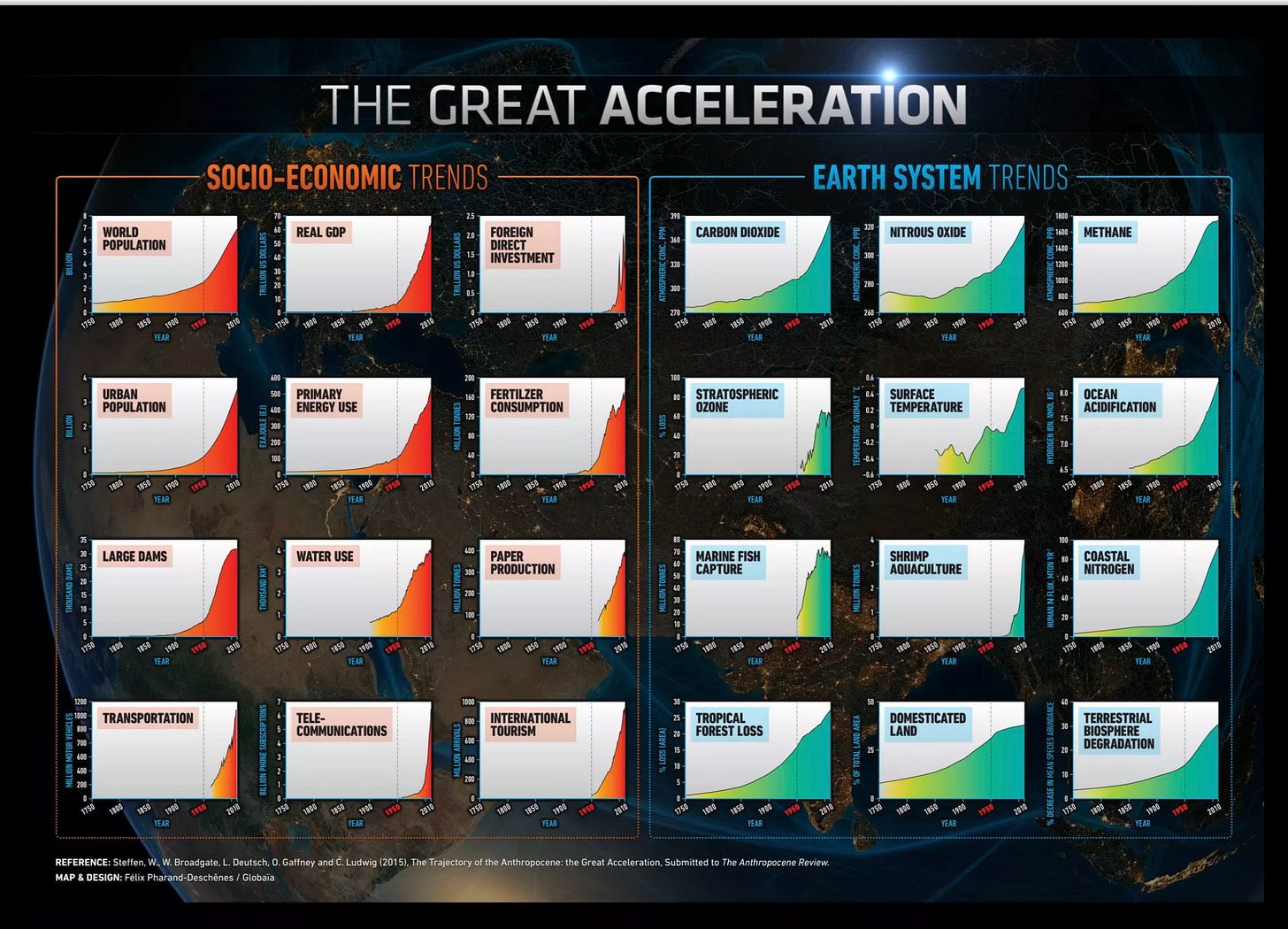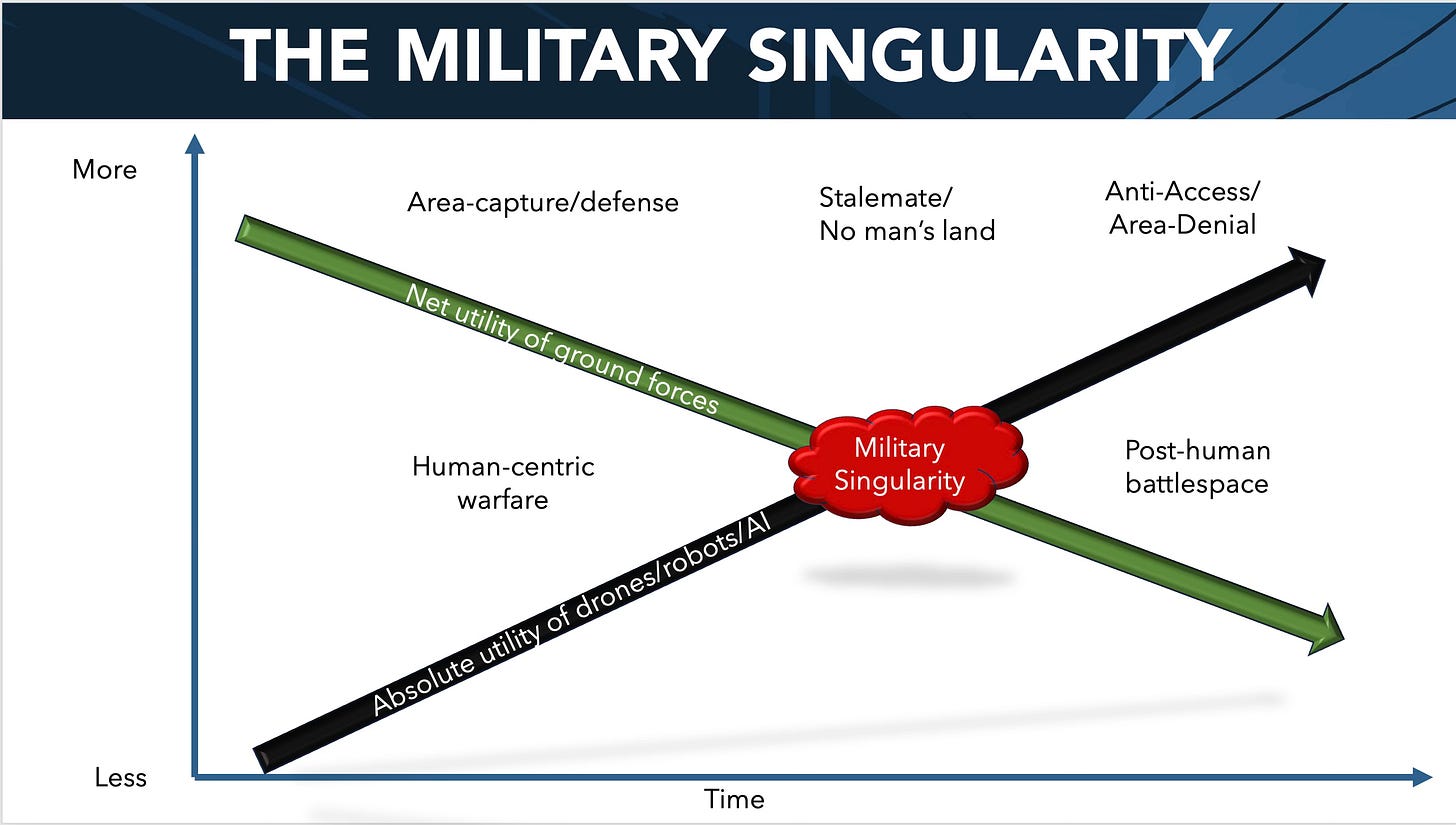The mid-century collisions to come
A slew of inevitabilities congregating down the road, creating magnificent opportunities for rapid evolution
You know those opening scenes in Oppenheimer where our hero is tortured by these images in his mind: things colliding, energies released, unintended consequences, externalities beyond comprehension. He senses things coming together and then exploding into something new and different.
What have we done?
The irony of all that imagery — and the movie to a large extent, for me at least: the creation of atomic weapons was a wonderful turning point in human history. A blessing without parallel in many ways. Without it, WWIII would have happened. Of that I have no doubt. The US and the Sovs would have gone at it in Europe. China and the US could have easily done the same in SE Asia.
But nukes changed all that, capping direct great power warfare and ushering in a period of economic transformation that remade our world both figuratively (globalization) and literally (the Great Acceleration super- empowering climate change).
Oppenheimer may have lived a tortured mental life following that great breakthrough, but the world was changed overwhelmingly for the better.
Do the counter-factual: we don’t invent nukes and we get WWIII, maybe IV, maybe V in the decades between 1945 and now. Entirely conceivable.
In that pathway, do you think the planet does any better? I mean, there would have been all that destruction but, then again, there would not have been all that consumption and growth.
Me? I see a wash: we trash the planet either way.
Except, in my preferred route of America seeding globalization around the planet and enabling the rise of a majority global middle class? That way generates a whole lot of better problems (not easy, not fabulous, just better) leading to collisions down the road.
What do I mean by that?
Climate change will depopulate the lower latitudes and send vast migratory waves to the north, which is richer, more developed, better run, far less densely populated, and opening up environmentally and economically with global warming.
That is a collision we see now in anti-immigrant fervor and right-wing populism, but I can equally argue that it’s a good collision, and not just for the reasons I cite above.
It’s good because it finally forces North-South economic integration — that fabled New International Economic Order of which those in the South have long dreamt.
That is a good thing and that is a fair thing.
Will it be stressful? You bet.
But it will be a good thing, dovetailing (colliding) with the North’s profound demographic aging and stunning depopulation.
So, climate change forces population shifts from a tough area in which it is harder to live to easier ones. It forces overpopulated areas to send migrants to underpopulated areas. It triggers migrations of the young to areas beset with too much aging.
Collisions, hard to manage, and yet positive in the end.
A perfect nugget of this collision-in-the-making: some countries debating a four-day work week while others seek a six-day work week. How can both be happening in advanced economies at the same time?
Collisions forcing radical evolutions.
Another collision that captures my mind regularly: the biotech revolution comes along right when global population is peaking and we’re looking at a long-time decline. Which fixes which here? Hard to say. We’ve stopped having so many babies right as we begin to radically extend human life.
Amazing timing, ja?
Another collision: the rise of drones and robots and AI, fantasized by many narrow thinkers in the tech world as signaling the end of humanity when, judging by Ukraine-v-Russia, I can make a better argument that we’re looking at the end of conventional warfare.
Beyond that, we’re looking at the deep suppression of violent crime, Robocop-like.
Worlds colliding: the rise of the majority global middle class triggers all sorts of resource-consumption requirements — with virtually none of those standard projections of utilization being feasible.
Thus, a revolution in resource utilization is forced into being, which dovetails nicely with our wider efforts to limit CO2 emissions and forge a more sustainable planet-wide lifestyle … amidst climate change and demographic aging, and a rush of “singularity” achievements (like we’re getting a preview of now in Ukraine).
Trying to hold in my mind all these inevitabilities and the collisions they generate … it’s hard but I find myself addicted to the effort. I suffer those same quasi-nightmarish images that Christopher Nolan used to portray Oppenheimer’s unruly mind.
The difference is, I don’t feel tortured by them. Instead, I sense a raft of unprecedented opportunities to redefine capitalism, to redefine democracy, to redefine government, to redefine North-South relations in our world, to redefine lifespan and life and aging, to redefine the work-life balance, to redefine our definitions of valued work roles (shifting them from production-centric to service/caring-centric).
The possibilities strike me as endless and beyond my describing right now (though I keep trying).
My BLUF slide from my brief, in effect, reflects the fumbling-in-the-dark state of my thinking:
That black box called the Zone of Turbulence is my placeholder. I front-load it with the North-South integration collision but it hides all those other collisions I speak of.
The big one right now and for the foreseeable future is the rising tide of migration collision, which I game out here:
And so the list of unsatisfactory (to me) slides grows. They each get closer but I keep sensing something even more complex.
More and more, I am beginning to think that Kurzweil’s notion of the Technological Singularity is just too narrow a lens for all that’s going on. Technology opportunes but it does not solve. That’s where we come in — always.
I also think that objectifying all these dynamics that way is dangerous to our mental health because it makes it all seem like no one is in control and everything is beyond our comprehension and — most importantly — that nobody is responsible and thus nobody can step up and fix things for the better.
I say that because we Americans, in my considered judgement, are responsible for all of this.
We chose to remake the world in our image after WWII and we are succeeding beyond all expectations, triggering all these collisions in the process that, in their accumulation, present humanity with a wide-open moment to evolve on multiple planes at the same time.
My point being we cannot check out of history at this moment. We can’t go back in search of some simplistic return to supremacy (all that golden age crap).
We have to move forward, through this minefield of colliding inevitabilities, because, if America, the progenitor and engineers of this modern world, refuses to step up and innovate the way ahead, it simply won’t get done.
I truly believe that.
I believe that our identities (collectively and individually) as Americans are by far the most important thing about each and everyone of us.
We have demonstrated our ability to bend history, reshape our world, even recast our planet. That is our record, that is our patriotism, that is our unshakeable identity.
The experiment we’ve unleashed with US-style globalization is just the American experience gone global, necessitating all manner of scary evolutions that we — again collectively — are better suited, as a blended nation/nationality/identity to engage, surmount, and ultimately master.
We are the avatars of our modern world. We are the right people for the right job.
To retreat into White Christian Nationalism is to renounce all that we have accomplished in this world, as well as our profound responsibility to shape and manage what comes next — namely, processing all those collisions and innovating new forms of damn near everything (families, communities, companies, countries, etc. — all that scary stuff that animates our present culture wars).
This notion that life today sucks baffles me.
We are living through the most amazing and wide-open period in human history, with all sorts of challenges staring us in the face, daring us to rush toward them with everything we’ve got.
I don’t want to live forever, but now is the best time — to be an American and a human — that this planet has ever known.
That is what drives me. That is what haunts me. That is what captures my imagination.
And I love it all.











Pandora, Prometheus, and Boltzmann.